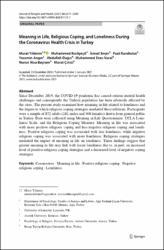Meaning in life, religious coping, and loneliness during the coronavirus health crisis in Turkey

Göster/
Erişim
info:eu-repo/semantics/openAccessTarih
2021Yazar
Yıldırım, MuratKızılgeçit, Muhammed
Seçer, İsmail
Karabulut, Fuat
Angın, Yasemin
Dağcı, Abdullah
Vural, Muhammed Enes
Bayram, Nuran Nisa
Çinici, Murat
Üst veri
Tüm öğe kaydını gösterKünye
Yıldırım, M., Kızılgeçit, M., Seçer, İ., Karabulut, F., Angın, Y., Dağcı, A., Vural, M. E., Bayram, N. N., & Çinici, M. (2021). Meaning in Life, Religious Coping, and Loneliness During the Coronavirus Health Crisis in Turkey. Journal of religion and health, 60(4), 2371–2385. https://doi.org/10.1007/s10943-020-01173-7Özet
Since December 2019, the COVID-19 pandemic has caused serious mental health challenges and consequently the Turkish population has been adversely affected by the virus. The present study examined how meaning in life related to loneliness and the degree to which religious coping strategies mediated these relations. Participants were a sample of 872 adults (242 males and 360 females) drawn from general public in Turkey. Data were collected using Meaning in Life Questionnaire, UCLA Loneliness Scale, and the Religious Coping Measure. Meaning in life was associated with more positive religious coping and less negative religious coping and loneliness. Positive religious coping was associated with less loneliness, while negative religious coping was associated with more loneliness. Religious coping strategies mediated the impact of meaning in life on loneliness. These findings suggest that greater meaning in life may link with lesser loneliness due to, in part, an increased level of positive religious coping strategies and a decreased level of negative coping strategies.

















